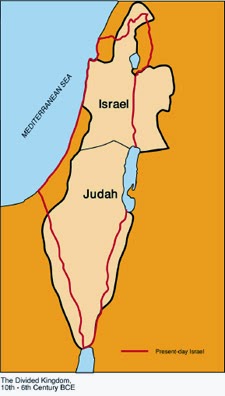In approximately 1440 BC, Moses led the Jewish people out of Egypt, beginning a journey to the land God had promised them in Canaan.1 The journey should have taken 11 days (Deuteronomy 1:2). But, instead, it took them 40 years!
The extended length of the journey was due to the people’s lack of faith that ultimately motivated some of them to rebel against Moses (Numbers 14:1-4 and Psalm 78:17-42). This behavior prompted God to decide that the generation that departed from Egypt would have to die in the wilderness before their descendants would be allowed to enter the Promised Land (Numbers 14:26-38).
Accordingly, it was about 1400 BC when the children of Israel were finally poised to cross the Jordan River and enter the land they had been promised. On that auspicious occasion, Moses paused their journey to summarize God’s Law for them (Deuteronomy 5-27). He also used the occasion to provide them with a detailed warning (Deuteronomy 28-29).
The Land Use Covenant
God had already given the descendants of Abraham through Isaac and Jacob the title deed to the land of Canaan (Genesis 12:1-3; 17:1-8; 26:1-5; and 28:13-14). Now, through Moses, He was going to make another covenant with them that would be related to their use of the land. Basically, what Moses told them was that even though they had an everlasting title to the land, their use and enjoyment of it would depend upon their obedience to God’s Laws which had been revealed to them during their wilderness wanderings.
Moses proclaimed that if the people were obedient to God, He would shower them with blessings (Deuteronomy 28:1-14). Their children, their crops and their animals would be blessed (28:4). Their enemies would be defeated and they would “abound in prosperity” and be established as “a holy people whom the rest of the world would fear (28:7-11).
Moses proceeded to sternly warn them that if they were disobedient to God, He would place curses on them. Their children would rebel, their crops would fail and their animals would not reproduce (Deuteronomy 28:16-19). They would also suffer from diseases, drought, and foreign domination (28:21,24,33).
Moses further warned that if they did not respond in repentance to these remedial judgments, the Lord would intensify them: “…then the LORD will bring extraordinary plagues on you and your descendants, even severe and lasting plagues, and miserable and chronic sicknesses… all the diseases of Egypt of which you were afraid…” (28:39-60).
Moses then declared that if these extreme measures did not produce repentance, God would subject them to the worst possible punishment — exile from their homeland: “Moreover, the LORD will scatter you among all peoples, from one end of the earth to the other end of the earth; and there you shall serve other gods, wood and stone, which you or your fathers have not known” (Deuteronomy 28:64).
Moses had already briefly mentioned this ultimate punishment of God in the survey of the Law which He had presented in the book of Leviticus. After listing many possible remedial judgments (Leviticus 26:14-31), just as in Deuteronomy, Moses warned that God’s ultimate judgment would be their “scattering among the nations” (26:33).
The Unfaithfulness of the Jewish People
At the conclusion of Moses’s warning recorded in Deuteronomy, the children of Israel crossed the Jordan River and entered the Promised Land. And they proceeded to violate God’s commands. They failed to annihilate the wicked Canaanite people, and they began to intermarry with them. This led the Jewish people into the worst sin of all — the practice of idolatry.
In response, God began to afflict them with remedial judgments. He also sent prophets like Elijah to call them to repentance.
The problems of rebellion and idolatry were particularly bad in the northern kingdom of Israel. The unified kingdom of David and his son, Solomon, had broken apart after Solomon’s death. The son of one of Solomon’s servants, a “valiant warrior” named Jeroboam, rose up against Solomon’s son, Rehoboam, and wrested ten of the tribes in the north from his control (I Kings 12: 1-28). He also set up an alternative center of worship to Jerusalem, establishing it in the hill country and calling it Shechem (I Kings 12:25. The capital was later moved to Samaria).2 This rebellion split Solomon’s kingdom, producing the northern kingdom of Israel with ten tribes and the southern kingdom of Judah with two tribes (Judah and Benjamin).

Having been born in rebellion, the northern kingdom of Israel continued in its rebellion throughout its history. It lasted 208 years, from 930 BC to 722 BC, and never once during that period of time did the kingdom ever have a righteous king — not one out of a total of 19!
Just as He had warned through Moses, God responded to Israel’s persistent rebellion by sending remedial judgments and raising up prophetic voices to call the people to repentance.
In the second part of this series on the dispersion of the Jews, we’ll look at the fall and exile of the Northern Kingdom of Israel.








Thank you so much for these great overviews that help me keep track of the details when I'm reading chapter-by-chapter. I love having a framework to tie everything together.
Thank you for those encouraging words, Evelyn! So good to hear these articles have been a blessing to you.
Dr. Reagan and nathan;
I'm enjoying the historical and prophetic aspects of this series which I just began reading this morning.
I immediately noticed that a prophetic passage in Deuteronomy 30, a sort of parallel with Ezekiel 37, and which is extremely relevant to the Israel of today (i.e. the diaspora of 70 AD, to the return and statehood in 1948, to today and into the very near future) was omitted from this part of the series. Perhaps it was not your intended message to highlight this particular passage of verses, but I find them absolutely fabulous in their prophetic content.
This general prophetic overview of Jewish history also includes a specific prophecy which precedes yet mirrors the later prophecies of Asaph's Psalm 83, Isaiah 11:12-14 and Ezekiel 28:24-26 (Deuteronomy 30:7 is in bold below) is at the tail end of Moses warning during his giving to Israel the Covenant of Moab (Deuteronomy 29-30). Here's the prophetic Deuteronomy 30:4-10.
"If any of you are driven out to the farthest parts under heaven, from there the Lord your God will gather you, and from there He will bring you. Then the Lord your God will bring you to the land which your fathers possessed, and you shall possess it. He will prosper you and multiply you more than your fathers. And the Lord your God will circumcise your heart and the heart of your descendants, to love the Lord your God with all your heart and with all your soul, that you may live.
Also the Lord your God will put all these curses on your enemies and on those who hate you, who persecuted you. And you will again obey the voice of the Lord and do all His commandments which I command you today. The Lord your God will make you abound in all the work of your hand, in the fruit of your body, in the increase of your livestock, and in the produce of your land for good. For the Lord will again rejoice over you for good as He rejoiced over your fathers, if you obey the voice of the Lord your God, to keep His commandments and His statutes which are written in this Book of the Law, and if you turn to the Lord your God with all your heart and with all your soul."
As noted, this is where Israel is today… in the process of returning to a Covenant relationship with God. And it is through this process that all Israel will come to recognize and receive Jesus the Messiah and all Israel shall be saved (Romans 11). It is also through this same Covenant of God (see italicized portion above) that Israel's enemies roundabout will have happen to them what had befallen Israel from 70 AD until the Restoration of Eretz Israel.
Thanks and I look forward to reading the next part!